In today's supplement to the Rzeczpospolita daily's jurisprudence supplement, an article entitled 'The strategic importance of public procurement' was published by Prof. UMK Dr. (hab.) Paweł Nowicki, a member of the SPZP.
The text of the publication is available here.
In today's supplement to the Rzeczpospolita daily's jurisprudence supplement, an article entitled 'The current valorisation clause is not perfect' was published by Jaroslaw Jerzykowski, a member of the SPZP.
The text of the publication is available here.
Today's supplement to the Rzeczpospolita daily on case-law features an article entitled ‘What is and what is not a mistake in the wording of a bid bond?’ co-authored by Agnieszka Gilowska, Member of the SPZP.
The text of the publication is available here.
Today's supplement to the Rzeczpospolita daily on case-law features an article entitled ‘"What is and what is not a mistake in the wording of a bid bond?",’ co-authored by Agnieszka Gilowska, Member of the SPZP.
The text of the publication is available here.
An article entitled ‘Tender collusion in completed proceedings,’ authored by Michal Gajdek, Member of the SPZP, appeared in the latest supplement to the Rzeczpospolita daily newspaper on case law.
The text of the publication is available here.
The Public Procurement Law Association and the publishing house, Wiedza i Praktyka, invite you to the debate:
"Amendments to procurement contracts in the era of war, inflation, and pandemics".
The event will take place on 31 May 2022 from 10:00 to 12:00
In awarding and executing public contracts in the special conditions related to the war in Ukraine, the COVID-19 pandemic, and the extraordinary increases in the prices and costs of work, huge challenges are posed even for the most experienced participants in the public procurement market. Representatives of public institutions, contracting authorities and contractors, experts, and practitioners are invited to participate in the debate that will discuss the problems of adapting contracts concluded under the public procurement regime to the changing circumstances. We encourage you to participate in this event and we hope that our discussion will contribute to a broader debate on the practice of applying the available legal solutions and the possible need to change them:
The debate will be moderated by the SPZP representatives: Aldona Kowalczyk, Anna Specht-Schampera, Dr Piotr Bogdanowicz, and Jarosław Sroka.
The guests taking part in the debate will be:
- Mariusz Haładyj, President of the Polish General Prosecutor's Office and member of the Public Procurement Council;
- Marcin Grabski, Head of the Legal Department, City Roads Authority;
- Mariusz Ciosek, Coordinator of the Public Procurement Team in the Department of Economic Regulation Improvement, Ministry of Development;
- Ewa Wiktorowska, Member of the Public Procurement Council;
- Dariusz Renczyński, President of the Regional Chamber of Accounts in Białystok; and
- Marek Orlik, Director of the Dragados/Polaqua Legal Department.
For more information and to register, please click here.
The latest supplement to the Rzeczpospolita daily concerning case law features an article entitled "Adjustments to a Contractor's Remuneration". This was authored by the SPZP member, Katarzyna Skiba-Kuraszkiewicz.
The text of the publication is available here.
In the latest supplement to the Rzeczpospolita daily concerning case law, an article was published entitled "Estimating the value of orders - errors and doubts". The article was written by Andrzej Czerniak, a member of the SPZP.
The text of the publication is available here.
On 20 April 2022, the Public Procurement Law Association (SPZP) submitted a position paper as part of the consultation on the project "A Green Paper on the Certification of Public Procurement Contractors" to the Ministry of Development and Technology.
The Green Paper aims to present the basic assumptions concerning the principles of the functioning of the certification of contractors in the public procurement system, to define its beneficiaries, and other entities involved in the certification process.
The position paper was prepared by a team of three SPZP members: Wojciech Merkwa (coordinating the work of the team), Katarzyna Skiba-Kuraszkiewicz, and Tomasz Zalewski.
The full text of the SPZP's position can be found at this link.
In today's supplement to Rzeczpospolita, the article "Knowledge and experience can be made available" was published. The article was written by Marcin Boczek, a member of the SPZP.
You can read the publication by clicking here.
In today's supplement to Rzeczpospolita, the article "When it is possible to stipulate that certain tasks are to be performed by one company and not another" was published. The article was written by Agnieszka Gilowska, a member of the SPZP.
You can read the publication by clicking here.
We invite you to read the article written by Katarzyna Kuźma and Wojciech Merkwa entitled "Circumstances of exclusion in public procurement law". The article is a summary of the debate that took place on 18 January 2011.
The article is a summary of the debate held on 18 January which was organised by Konfederacja Lewiatan and the Public Procurement Law Association. The discussion focused on the effects of the new wording of a provision of Public Procurement Law on the public procurement system, providing for the possibility to exclude a contractor from a procedure due to problems with the performance of other contracts.
In today's supplement to the Rzeczpospolita daily regarding jurisprudence, the article "Public-private partnerships should have clear rules" was published. It was authored by Irena Skubiszak-Kalinowska, a member of the SPZP.
You can read the publication by clicking here.
(last update - 22 march 2022)
Dear All,
A very large number of people from Ukraine are now coming to Poland to find shelter from the war. It is obvious that, apart from individual aid measures, the size of the tragedy and its effects require the involvement of state institutions. In particular, the process of organising direct support may sometimes require applying the provisions of the Act of 11 September 2019 – Public Procurement Law (“PPL”).
With this in mind, in a sense of responsibility and solidarity, we present key practical information which may be useful to entities having the status of a contracting authority under the PPL. To ensure the document's communicativeness, we present the prepared explanations in the form of 10 practical questions and concise answers.
If you identify any further difficulties or need further clarifications, please contact us at the following Association e-mail address: This email address is being protected from spambots. You need JavaScript enabled to view it.. On a free-of-charge basis, we will try to answer any questions concerning the PPL aspects related to the procedure of awarding public contracts by Polish contracting authorities as part of direct support to persons affected by the acts of war in Ukraine.
The PPL issues of key practical importance for the efficient provision, in the public procurement system, of aid due to a humanitarian crisis include:
1. Are there specific regulations for awarding contracts in the case of a humanitarian crisis?
No, as at the date of the publication of the statement, no regulations have been enacted that would regulate the award of public contracts to counter the negative effects of the humanitarian crisis caused by the war in Ukraine.
However, we would like to remind you that, in 2015, the European Commission published Communication COM (2015) 454 “on Public Procurement rules in connection with the current asylum crisis”. This document is a useful source of practical information on which the information contained in this statement is also based.
Link to the European Commission Communication.
2. When is it necessary to apply the PPL’s provisions?
The application of the PPL’s provisions is obligatory only if the following conditions are (jointly) met:
3. Who is obliged to apply the PPL’s provisions?
The status of a contracting authority, i.e. the entity obliged to apply the PPL, is held by the entities referred to in Articles 4-6 of the PPL. A detailed analysis of this status may be problematic. In view of the challenges faced, it is important to emphasize that such a status is held, in particular, by:
4. Are foundations obliged to apply the PPL’s provisions?
This doubt is relatively common for foundations which receive public funding for their activities. The mere fact of obtaining a grant or other form of support to implement a specific project does not create an obligation to apply the PPL’s provisions. What is crucial is the nature of the financial aid. According to the valid opinion of the President of the Public Procurement Office, such an obligation arises where the support consists of financing the foundation’s general functioning. However, such an obligation does not arise where the support from public funds covers a specific project’s implementation.
Link to the opinion of the President of the Public Procurement Office.
5. What value of contracts require the PPL’s provisions to be applied?
If contracting authorities are public institutions (in particular, local government units and government administration authorities), the threshold for the mandatory application of the PPL’s provisions is PLN 130,000.
For “sectoral contracting” authorities, this threshold is:
- PLN 1,919,502 for supplies and services contracts,
- PLN 4,453,600 for social services contracts, and
- PLN 23,969,275 for construction works contracts.
The conclusion of contracts with a value lower than the amounts specified above does not require the PPL’s provisions to be applied. All the amounts given above are exclusive of VAT.
6. How to estimate the contract value?
The contract value is determined based on the economic operator's total estimated remuneration excluding value added tax (VAT), determined with due diligence. If the contracting authority has recently awarded contracts similar to those it intends to award in connection with the organisation of aid to Ukrainians and Ukraine, doubts may arise as to whether, to estimate the value of the contract, both “purchases” should not be aggregated.
If the contracting authority demonstrates that it could not foresee the need to award another, similar contract, then the condition of the time concurrency test would not be met. In such a situation, there will also be no obligation to jointly estimate the value of the contracts.
7. Is it necessary to apply the PPL’s provisions whenever the estimated value of the contract exceeds the de minimis threshold?
In these circumstances, there may be more frequent situations where, even despite the value of the contract exceeding the de minimis threshold, it will not be necessary to apply the PPL’s provisions to award the contract. Exceptions with a particular potential for use include:
7a. Have any special solutions been implemented in the area of public procurement law in connection with the war in Ukraine?
Yes, the Act of 12 March 2022 implemented solutions on assisting Ukrainian nationals regarding the armed conflict in the territory of Ukraine (“Special Act”) which, as regards the award of contracts, entered into force on the date of its publication, i.e. with effect from 24 February 2022.
The Special Act’s provisions provide for exemptions from the obligation to apply the PPL’s provisions when concluding agreements necessary to perform the following tasks:
However, one may estimate that the exemption laid down in Section 12 paragraph 6 of the Special Act will be of crucial practical importance. Under that provision, the PPL will not apply to public contracts necessary to provide assistance consisting of:
However, it is important that the subjective scope of this exemption has been precisely indicated and many ordering parties will not be eligible for its application.
It may be used by:
It should also be emphasised that only the agreements necessary to provide the assistance referred to above as well as those necessary to communicate the assistance addressed to Ukrainian citizens are covered by the exemption. When concluding an agreement based on an exemption, it is obligatory to publish, in the Public Procurement Bulletin, information on the factual circumstances justifying its application as well as to provide:
8. If there are no grounds to exclude the application of the PPL’s provisions, is it necessary to organise an open, formalised procedure, e.g. an open tender?
In these circumstances, in many cases, it will be possible to use the single-source procurement procedure whereby the contracting authority awards the contract after negotiations with only one economic operator under Article 214(1)(5) of the PPA. Under that provision, the procedure in question may be applied where, due to an exceptional situation not resulting from reasons attributable to the contracting authority which it could not have foreseen, urgent execution of the contract is required and the time limits specified for the other procurement procedures cannot be complied with.
Before applying that prerequisite, it is always necessary to consider in detail whether all the conditions listed under Article 214(1)(5) have been met. The reasonable solution is to provide as detailed factual and legal justification as possible.
However, it may be assumed that, in the current circumstances, the demonstration of those grounds should not cause particular difficulties. In this regard, the guidelines contained in the above-mentioned Communication of the European Commission (COM (2015) 454), the extracts of which are cited below, are helpful and should certainly be worth using in formulating a justification to apply the aforesaid provision:
The formal obligations of the contracting authority that awards a contract is limited to inviting the successful tenderer to negotiations, keeping a record of the procedure, concluding a contract, and publishing a notice. From 1 January 2021, the application of the single-source procurement procedure does not require, in any respect, notifying the President of the Public Procurement Office of such a procedure being initiated.
9. In the case of a decision to organise a competitive procedure (e.g. an open tender), is it possible to speed up the procurement process in relation to the default schedule resulting from the PPL’s provisions?
In some situations, the contracting authority may consider that the optimal solution is not to award a contract on a single-source basis, but to organise a competitive procedure. However, in such circumstances, the contracting authority does not have to worry about the necessity to organise a long-lasting procedure.
In particular, due to the urgent need to award a public contract, there is a possibility to shorten the time limit for the submission of applications for admission to the tender procedure or the time limit for the submission of tenders.
Furthermore, the identification of the urgent need justifies the application of a negotiated procedure without publication (Article 209(1)(4) of the PPA). This is a procedure whereby a contracting authority negotiates the terms of a public procurement contract with economic operators of its choice and then invites them to submit their tenders. Therefore, this is a reasonable solution because although the contracting authority intends to obtain the most advantageous tender during the competitive rivalry between economic entities, it wants to limit their circle to only a few selected economic operators.
In the case of sectoral contracting authorities, the power under Article 393(1)(1) of the PPA may also be a specific instrument to make procedures more flexible and less formalised. That provision allows an abstention from applying obligatory grounds for exclusion and therefore, demanding subjective requests for subjective evidence relating to those grounds.
10. Will the initiation of appeal proceedings by lodging an appeal with the National Board of Appeals always entail an extension of the procedure?
The contracting authority’s activities may be challenged by economic operators as being non-compliant with the PPL’s provisions by lodging an appeal with the National Board of Appeal (“KIO”). If an appeal is lodged, the conclusion of a public procurement contract before the resolution of the appeal proceedings will, in principle, be impossible.
However, where an appeal is lodged at the stage following the selection of the most advantageous tender, the contracting authority may have, at its disposal, an instrument enabling the conclusion of the contract despite the appeal being lodged. Namely, under Article 578(2) of the PPA, it is possible to submit a request to the KIO to repeal the ban on the conclusion of the contract which the KIO will take into account if:
It is worth noting that, based on the KIO’s jurisprudence to date, convincing arguments can be formulated that the ongoing humanitarian crisis caused by the war in Ukraine would be the basis for lifting the ban on concluding the contract, which obviously, in specific circumstances, requires detailed justification.
In the latest supplement to the Rzeczpospolita daily concerning jurisprudence, an article was published titled, "The submitted parts of financial statements must have a specific form". The article was authored by Sylwester Kuchnio, a member of the SPZP.
The text of the publication is available here.
18 January 2022. The Public Procurement Law Association had the pleasure of co-organising a debate with the Lewiatan Confederation entitled, "PROBLEMS WITH PERFORMING A CONTRACT AND GROUNDS FOR EXCLUSION FROM PUBLIC TENDERING".
The following speakers participated in the debate: Hubert Nowak, President of the Public Procurement Office; Mariusz Haładyj, President of the Polish General Prosecutor's Office and member of the Public Procurement Council; Przemysław Grosfeld, Deputy Director at the Ministry of Development and member of the Public Procurement Council; Małgorzata Śledziewska, Deputy Director of the Procurement Department at PGE Polska Grupa Energetyczna S.A.; and Artur Luczak, Director of the Rzeszów Branch of Erbud S.A.
The meeting was chaired by the following members of the SPZP: Katarzyna Kuźma and Wojciech Merkwa.
The debate was devoted to one of the most controversial grounds for exclusion provided for in Art. 109 sec. 1 item 7 of the Public Procurement Law, i.e. the consequences of non-performance or improper performance of a prior public procurement or concession agreement. The speakers emphasised that this is an extremely important topic for all participants in the public procurement market, yet one which raises significant interpretative questions and is treated inconsistently in case law.
Some of the speakers suggested that legislative changes should be introduced to make the rules more precise. Other participants of the debate suggested promoting good practices among market participants or developing interpretative guidelines which would help to standardise the application of Article 109 (1) (7) of the Public Procurement Law in practice.
The debate enjoyed great interest which translated into a lively discussion among the participants.
We would like to thank the speakers for a valuable discussion, as well as all who actively participated in the debate.
Please view the debate recordings:
Part one
Part two
Part three
Today's issue of Dziennik Gazeta Prawna features a ranking of lawyers that have the greatest impact on social, economic, and political life in Poland. Aldona Kowalczyk, co-founder and President of the Board of the Public Procurement Law Association (PPLA), was singled out in the ranking.
"In our ranking, we traditionally focus on which lawyers have had an impact on our reality and how they have expressed that impact. We are reserved in our assessments; we leave them to our readers," concluded Krzysztof Jedlak, editor-in-chief of Dziennik Gazeta Prawna.
The ranking indicates that PPLA "focuses on solving the real problems in the public procurement market and does so extremely effectively. Without beating about the bush, and focusing on the substance of the issue, the PPLA points out the dangers of misinterpreting the rules and fights to change approaches."
The PPLA associates more than 50 lawyers actively providing legal assistance in the field of public procurement law, PPP, and concessions. DGP's list emphasises the reputation and recognition of the Association as a professional organisation whose voice resounds in relationships between officials and participants in the public procurement market.
"Tenders - you can combine potentials to meet the conditions for participation in the procedure," by Irena Skubiszak-Kalinowska, a member of the SPZP, has been published in the latest supplement to the Rzeczpospolita daily on jurisprudence.
You can read the publication by clicking here.
Today's issue of Dziennik Gazeta Prawna features an article on an opinion issued by the Public Procurement Office, at the request of the Public Procurement Law Association, regarding the application of the civil law institution of the transfer of direct payments to subcontractors for public works contracts.
In the article, Aldona Kowalczyk, Public Procurement Law Association Chairman; and Jarosław Jerzykowski, a member of the PPLA Audit Committee; comment on and explain the content of the opinion.
The article is available in print and on the DGP website.
In the latest supplement to the Rzeczpospolita daily on jurisprudence, two articles written by SPZP’s (Public Procurement Law Association) members were published:
On 4 January 2022, the Public Procurement Office responded to the SPZP's request for an opinion on how to apply the civil law institution of remitting direct payments to subcontractors undertaking public works contracts. In its opinion*, the Public Procurement Office (UZP) confirmed that the application of remitting the debt owed to a contractor based on a subcontractor agreement does not conflict with the provisions of Public Procurement Law.
* the text of the PPO's reply is only available in Polish
You can read the publication by clicking here.
Konfederacja Lewiatan and the Public Procurements Law Association invite you to the following debate:
PROBLEMS WITH PERFORMING A CONTRACT AND GROUNDS FOR EXCLUSION FROM PUBLIC TENDERING
to be held on 18 January 2022, 10:00 a.m. – 12:00 p.m.
The Public Procurements Act (PPA), in force since 1 January 2021, has introduced a number of changes, including in the matter that is so significant for the public procurements market, in the grounds for exclusion from procedures for the award of a public contract. One of the prerequisites that is most controversial in practice, inconsistently construed by case law, has been provided for in Art. 109 Sec. 1 point 7 of the PPA.
This provision was modified in comparison to the previously applicable version (which was also controversial). The new wording was not successful in dispelling previous doubts; instead, it also has generated new, previously unknown, risks.
One of the essential elements which deepens doubts is the method in which contractors should prepare their statements in the European Single Procurement Document (ESPD). This question has a broader scope than the prerequisite for exclusion under Art. 109 Sec. 1 point 7 of the PPA. In this regard, the decision-making practice and case law are inconsistent and the consequence of this legal uncertainty leads to: 1) the risks of breaching the principle of equal treatment of contractors in granting access to the public contracts market; and 2) the growing number of exclusions from the procedures for the award of a public contract in connection with the alleged misleading practices of the contracting authority.
This legal uncertainty does not serve the participants of the public procurements market, and the practice of referring to this provision in proceedings seems to increasingly depart from the purpose which the provision was to serve.
The topics raised for discussion during the meeting will include:
The meeting will be hosted by Katarzyna Kuźma and Wojciech Merkwa, members of the Public Procurements Law Association.
The following guests will take part in the debate:
To find out more information and register, click here LINK.
In the latest supplement to the Rzeczpospolita daily on jurisprudence, the article “New PPL (Public Procurement Law): clarification of contract terms and conditions” was published, co-authored by Piotr Trębicki, a member of the Public Procurement Law Association.
You can read the publication by clicking here.
In the latest supplement to the Rzeczpospolita daily on jurisprudence, the article “Consortium member's experience pays off” was published. The author of the article is Marzena Jaworska, a member of the Public Procurement Law Association.
You can read the publication by clicking here.
In the latest supplement to the Rzeczpospolita daily on jurisprudence, an article was published “Report on the performance of the contract - an important purchasing tool or unnecessary burden?”, the author of which is UMK’s professor, PhD Paweł Nowicki, a member of the Public Procurement Law Association.
You can read the publication by clicking here.
On 26 October 2021 PPLA filed with the President of the Public Procurement Authority a request for the issuance of an opinion concerning the possibility to use the institution of remittance ( Polish: przekaz, in the meaning of the provisions of Art. 921(1) of the Civil Code) of the remuneration payable to the contractor by the contracting authority in the course of performance of the public procurement agreement, so as to cover the contractor’s debt resulting from sub-contracting agreements.
The request is driven by the doubts that arise with regard to the admissibility of using remittance and with regard to the relationship between the provisions of the Civil Code on remittance and the provisions of Public Procurement Law on direct payment to the subcontractor. A confirmation that it is possible to make payments to the subcontractors by way of remittance is of major importance for the execution of procurements for construction work. When the remittance is made the subcontractor effectively obtains the payment that is due to it. The contracting authority is, in turn, confident that payment to the subcontractor was actually made which releases it from the obligation to open the procedure of direct payment referred to in Art. 465 of Public Procurement Law and, with regard to the subcontractors performing construction work, also from the joint and several liability towards them under Art. 647(1) § 1 of the Civil Code.
Ultimately, a remittance is also advantageous for the contractor. The contractor may thus make payments to its subcontractors in a simplified manner without having to directly commit its own funds.
The text of the request is available here.
The Public Procurement Law Association is pleased to invite you to a webinar on "Public procurement in the UK – has Brexit provoked any (substantial) changes?", which will be held on 22 April 2021 at 1:00 p.m. BST / 2 p.m. CEST.
Brexit is a massive social, economic and also legal challenge. Public procurement has been one of the heavily influenced sectors. We have the privilege of hosting Professor Sue Arrowsmith who has been deeply involved in the recent proposals for changes within the public procurement system in UK in the new era. Please join our webinar and stay updated.
The meeting will be held in English.
Webinar agenda:
Speaker: Professor Sue Arrowsmith QC (hon), BA, D Jur, MCIPS, Professor Emerita, School of Law, University of Nottingham
Moderator: Wojciech Hartung, PhD, member of the Public Procurement Law Association
About the Speaker:
Professor Sue Arrowsmith QC (hon) is Professor Emerita at the University of Nottingham. She has a B.A. (first class hons.) from Oxford University and a D.Jur from Osgoode Hall Law School and is a Member of the Chartered Institute of Procurement and Supply (MCIPS).
In 2007 she was awarded the CIPS Swinbank Medal for thought innovation in purchasing and supply and in 2019 was made an honorary Queens Counsel (QC) in recognition of her significant contribution to the development of the law of England and Wales in the field of public procurement.
She has been instrumental reforming public procurement rules and was a member of the UK’s Procurement Transformation Advisory Panel, advising on the development of the Government’s 2020 Green Paper, Transforming Public Procurement. She is also a member of the Government’s its Thematic Working Group on Procurement advising on public procurement rules in trade agreements and a Member of the Advisory Committee for the Independent Review of Criminal Legal Aid. She has been a member of the UNCITRAL Procurement Experts Group, the World Bank International Advisory Group on Procurement, (for nearly 20 years) the European Commission's independent Advisory Committee on procurement, and an Expert with the International Partnership against Corruption in Sport (IPACS), Taskforce 1. She has also been consultant for the UK, UN, WTO, OECD, EU, European Central Bank, ILO and the Law Commission of England and Wales.
Her publications have been extensively cited by courts around the world. Her many books include (most recently) The Law of Public and Utilities Procurement (3rd ed. 2014 (Vol.1) and 2018 (vol.2)), which was described in 2018 by the domestic High Court as “the leading academic authority” and “highly persuasive” for the courts in making decisions in this field.
Date: April 22nd, 1.00-2.30 p.m. BST (2.00-3.30 p.m. CEST)
Registration
The meeting will be held in English on the Zoom platform. Participation in the webinar is free of charge.
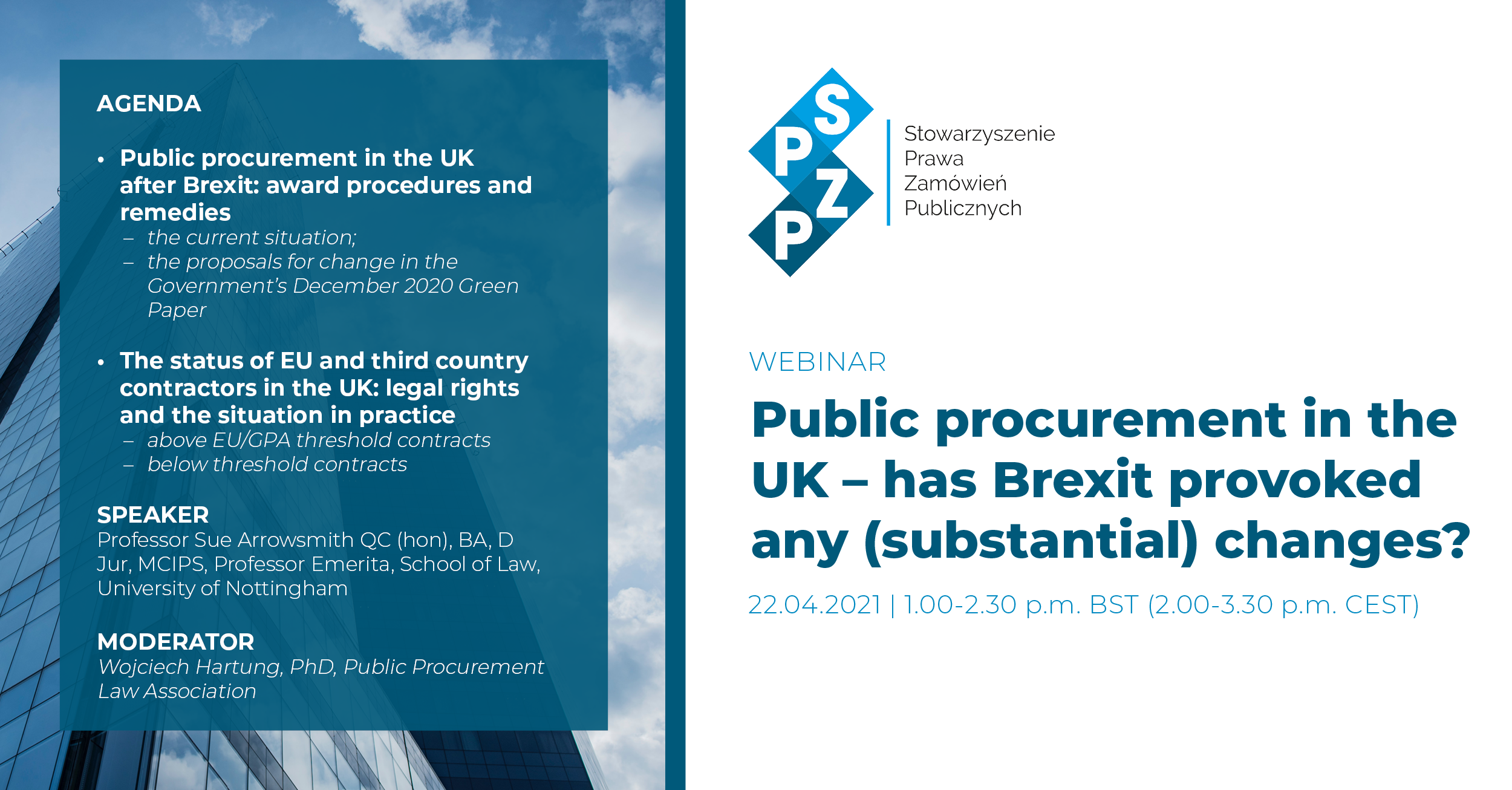
Thank you for taking part in the webinar: "Green Transition in Public Procurement". We would like to extend particular thanks to the speakers for an insightful and professional discussion.
If you were unable to attend the webinar live, you can still watch the recording at: https://youtu.be/kL_OAThQmsE
Public Procurement Law Association warmly invites to open access webinar on "Green Transition in Public Procurement", which will be held on March 30, 2021 at 11:00 CET.
The meeting will be held in English.
Speakers:
Date: March 30, 2021 | 11:00 – 12:30 CET
Link to the Zoom Webinar (registration is not required).
The meeting will be held in English on the Zoom platform. Participation in the conference is free of charge.
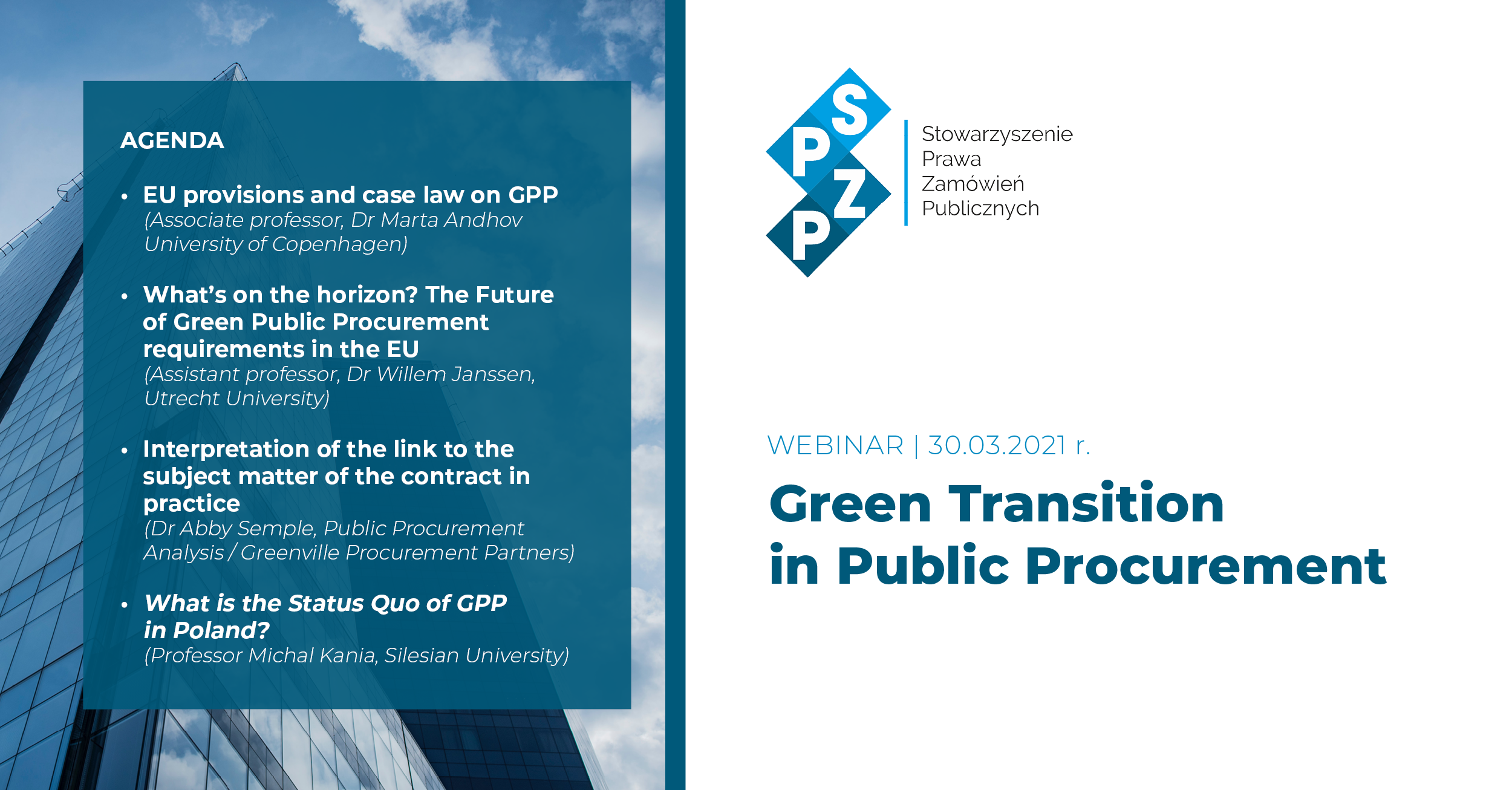
On 1 June 2020, the final oral part of the moot court competition entitled “Client Representation before the KIO National Appeals Chamber” for students of Law and Administration Faculties, was held at the Warsaw offices of WKB Wierciński, Kwieciński, Baehr.
The competition was organized by the Public Procurement Law Association. The competition award winners will get the chance to take part in trainee programs in law firms supporting the competition, such as Bird & Bird, BSJP, Clifford Chance, Dentons, Domański Zakrzewski Palinka, Jerzykowski i Wspólnicy, Schampera Dubis Zając i Wspólnicy, Wardyński i Wspólnicy, and WKB Wierciński Kwieciński Baehr.
The following four universities entered their teams into the competition:
Mickiewicz University, Poznan (Supervisors: Prof. UAM Dr hab. Katarzyna Kokocińska, Dr Jarosław Kola), Jagiellonian University (Supervisor: Dr Aleksandra Sołtysińska), University of Lodz (Supervisor: Dr Anna Górczyńska), University of Warsaw (Supervisor: Dr hab. Piotr Bogdanowicz).
The competition was staged in two phases:
The teams’ ranking following the written part of the competition was as follows:
The briefs were evaluated in terms of the quality of the legal argumentation presented, formal correctness, as well as an unmistakable flair for polemics.
Based on these criteria, the submissions drafted by the University of Warsaw’s team received the highest score.
According to the Rules of the Competition, oral performance received twice as many points as the written part. For this reason, the oral phase was crucial for the final outcome.
During the final part of the competition, the teams took part in a mock trial before the KIO, acting as the parties’ counsel. The teams’ performance was evaluated by a panel consisting of Sylwester Kuchnio, Esq. (Chair), Aldona Kowalczyk, Esq. and Jan Roliński, Esq.
The atmosphere of the finale bore striking resemblance to that of a real court battle before the KIO, the participants showing a high level of preparation for the hearings and full professionalism in the speeches they delivered.
When assessing oral presentations, the jurors took into account the substantive level of the speeches as well as the rhetorical skills of the respective speakers. Highest scores were given for prompt and apposite retorts, and to speakers who managed to keep their cool and come up with creative solutions in unforeseen courtroom situations (e.g. in answers to questions asked by the adjudicating panel).
Conversely, speakers who repeated the arguments presented in the pleadings parrot fashion, excessively focused on allegations that were irrelevant for the outcome of the case, reviewed their opponents’ briefs instead of fighting the substantive accusations that they contained, and especially those reading prewritten speeches, were given fewer points.
Upon adding up the scores for the written and oral parts, the final results of the Moot Court competition are as follows:
Congratulations to all Winners and Participants!
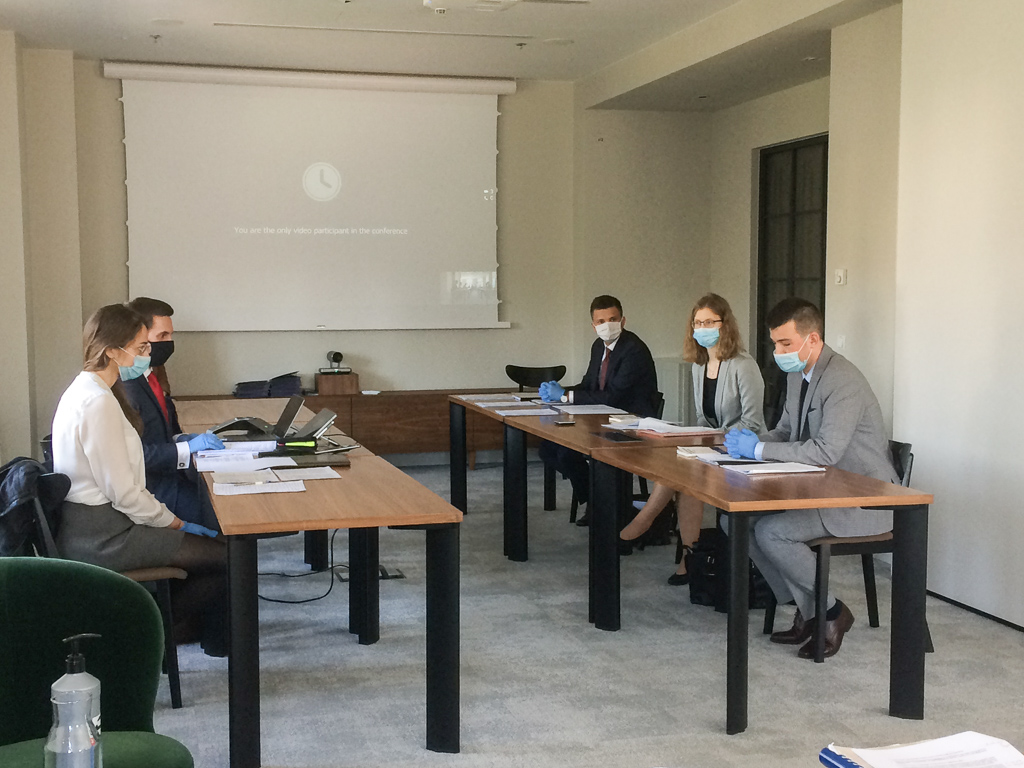
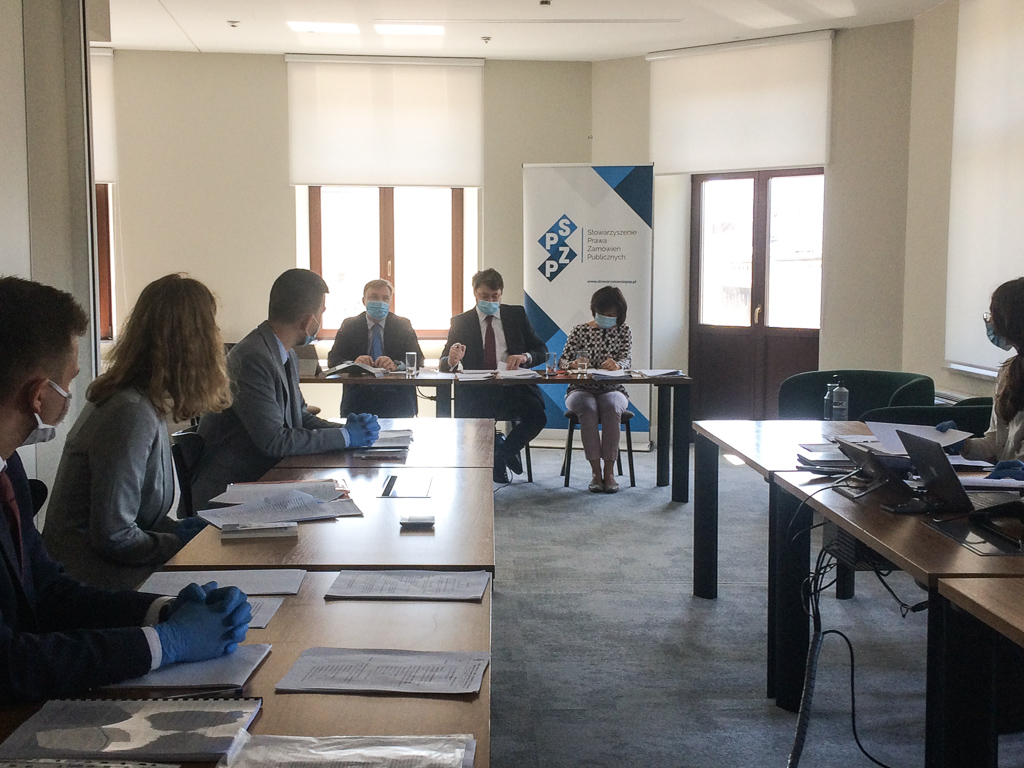
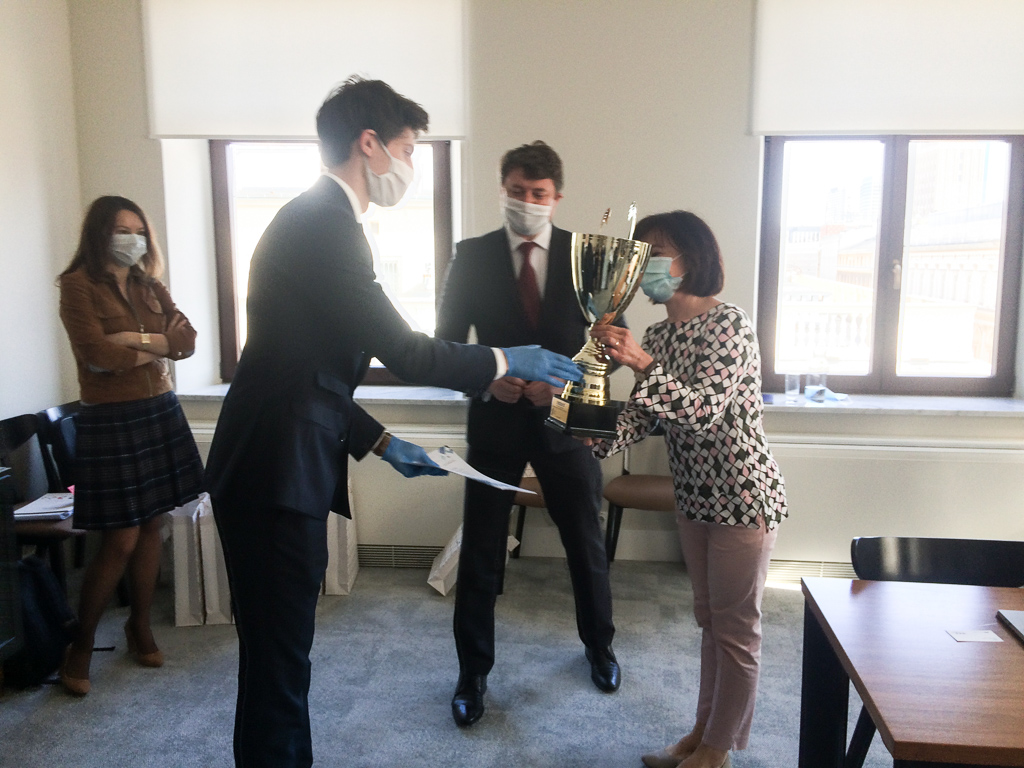

In keeping with the Rules of the “Client Representation before the KIO National Appeals Chamber” competition, announced by the Public Procurement Law Association, we present four teams which signed up for the competition, team draw results and the competition’s case studies.
Team A – Mickiewicz University, Poznan (Supervisors: prof. Dr hab. Katarzyna Kokocińska, Jarosław Kola)
o Aleksandra Grabowska
o Alicja Sementina
o Filip Golędzinowski
o Łukasz Wasilenko
o Maciej Kowalczyk
Team B – University of Warsaw (Supervisor: Dr hab. Piotr Bogdanowicz)
o Eryk Ryciak
o Marcin Woźny
o Agnieszka Warsewicz
o Mateusz Mućka
o Adam Jeżewski
o Marta Radke
Team C – Jagiellonian University (Supervisor: Dr Aleksandra Sołtysińska)
o Tomasz Mielko
o Maciej Gilis-Januszewski
o Michał Kulikowski
o Kinga Kanecka
o Rafał Rutkowski
o Karol Witas
Team D – University of Lodz (Supervisor: Dr Anna Górczyńska)
o Julia Bilska
o Magdalena Rogozińska
o Maria Szychowska
o Adam Kramarz
o Katarzyna Leszka
Click here to download case studies. See below for teams assigned to each individual case:

More information on the competition, time schedule and the Competition Rules are available here.